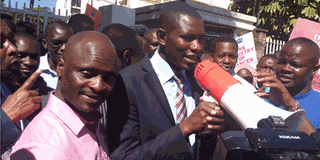Senate, KMPDU officials to hold talks over health crisis

KMPDU chairman Samuel Oroko (left) and Secretary-General Ouma Oluga address union members and supporters outside the labour court in Nairobi on January 3, 2017. The team will today meet with the Senate Health Committee for mediation talks. FILE PHOTO | NATION MEDIA GROUP
What you need to know:
- The meeting to be chaired by the committee chairman, Dr Wilfred Machage is meant to convince the doctors to return to work.
- Governors say they are willing to do anything within the law to ensure doctors end the strike.
- Cotu and KNCHR are spearheading the talks, after the Employment and Labour Relations Court, granted their wish to intervene.
The Senate Health Committee is this morning set to meet representatives of striking doctors in a bid to resolve the impasse that has paralysed operations in public hospitals.
The meeting, to be chaired by the committee chairman Wilfred Machage, is meant to convince the Kenya Medical Practitioners, Pharmacists and Dentists Union (KMPDU) to soften its hard-line position, which has left patients suffering for more than two months now.
The committee will later meet government officials and other players, including the Council of Governors, as they work round the clock to beat the seven days the court allowed them to find a solution to the crisis.
Doctors and governors have expressed optimism that a solution will be found despite suspicions that there was no good will to strike a compromise over the 2013 collective bargaining agreement (CBA), which is at the centre of the dispute.
DOCTORS BLAMED
Council of Governors chairman Peter Munya said governors are willing to do anything within the law to ensure doctors end the strike.
Governors blamed doctors for unnecessarily lengthening the strike, claiming the medics usually withdraw from the negotiating table when the two sides are about to strike a compromise.
The Central Organisation of Trade Unions and the Kenya National Commission on Human Rights are spearheading the talks, after the Employment and Labour Relations Court granted their wish to intervene.
“We will cooperate fully and engage proactively. We hope the other side (government) will also do the same,” said KMPDU Secretary-General Ouma Oluga.
He said it is unfortunate that the government has remained insensitive to many patients who cannot afford medical services at private hospitals by reneging on a CBA that was endorsed by its officers.
“It is a shameful thing that a country can allow all doctors to be on strike. The government has abdicated its own responsibility of health provision, to the doctors,” Dr Oluga said. “It shows the level of neglect that the government has on its citizenry.”
'HARMONISED CURRICULUM'
Medical schools have also closed down because besides relying on the doctors to teach, students use public hospitals for their practical sessions, which are mandatory in the medical courses.
“There is no production of new doctors. Universities that offer the course have closed because it is the same doctors who teach the students,” Dr Oluga said.
There are also fears that patients, especially those with complications that require specialised treatment but can’t afford the private hospitals, risk dying while being attended to by unqualified medical practitioners or traditional birth attendants.
The unionists said the CBA covers a wide range of issues meant to improve healthcare in the country, following concerns that those who cannot afford medical cover to access well-equipped hospitals, suffer in silence.
“We want a harmonised curriculum that will produce a uniform quality training irrespective of the medical school, one goes to,” Dr Oluga said saying it is not all about salaries as the public has been made to believe.
NEGOTIATION TEAM
Justice Hellen Wasilwa directed that the negotiating team include other government agencies, to be represented by not more than three officials each.
This include the Council of Governors, Auditor-General, Ministry of Finance, Ministry of Labour, Salaries and Remuneration Commission, Federation of Kenya Employers and Public Service Commission.
The Council of Governors liaison team in the talks will be led by its Chief Executive Officer Jacqueline Mogeni, with the council's Human Resource, Labour and Social Welfare Committee chaired by Kisii Governor James Ongwae having supervisory roles.
Dr Machage said the country, which already has a shortage of doctors, risks losing more if the government continues to take the profession for granted.
He observed that doctors have been leaving Kenya for greener pastures overseas due to unfair treatment back at home.




